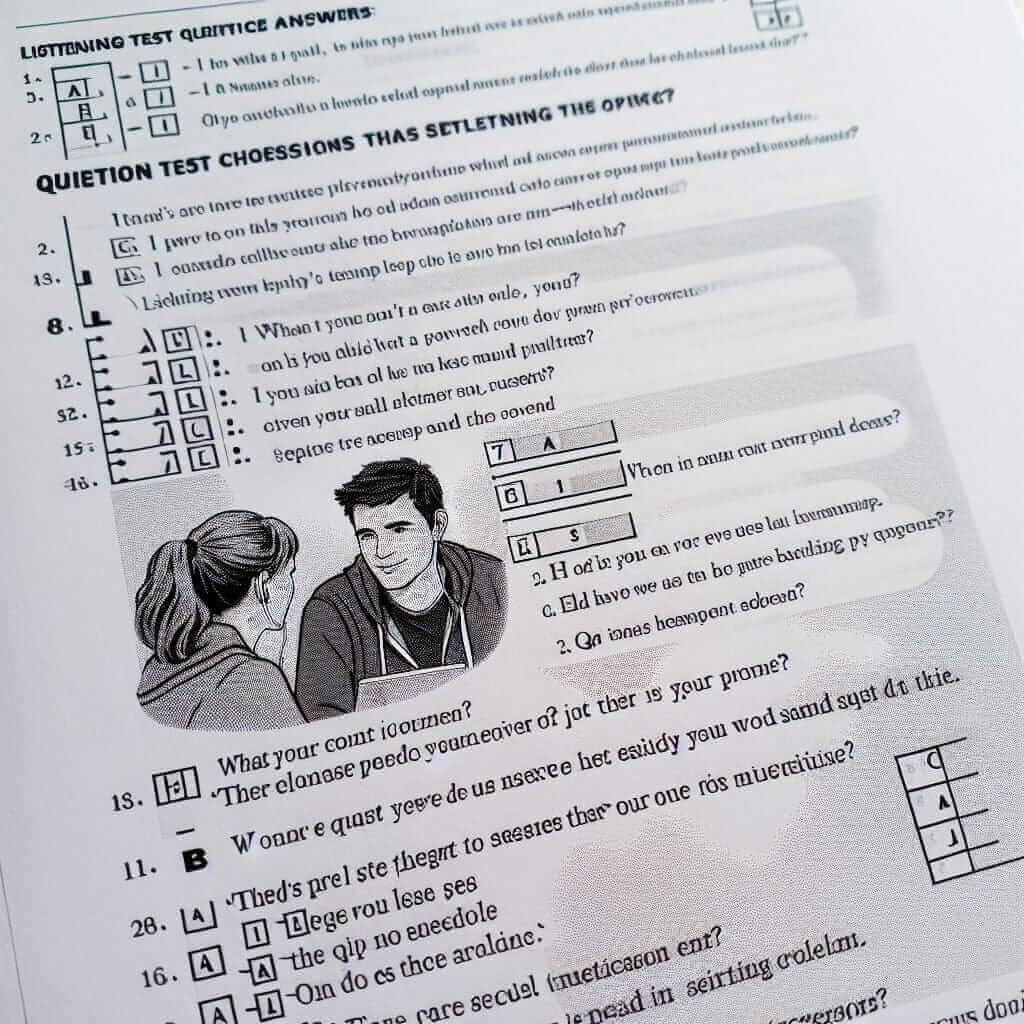The IELTS Listening test can feel like a whirlwind of accents, fast-talking speakers, and tricky questions. As an IELTS instructor with over two decades of experience, I’ve seen firsthand how important mastering this section is for achieving your desired band score. But don’t worry, it’s entirely achievable! This comprehensive guide will equip you with the strategies and insights you need to boost your listening comprehension and confidently tackle the IELTS Listening test.
Understanding the IELTS Listening Test Format
Before diving into strategies, let’s break down the test itself. The IELTS Listening test is the same for both Academic and General Training modules. It consists of four sections, each with ten questions, making a total of 40 questions. You’ll hear each recording only once, so focus is key! The recordings feature a variety of accents, from British and American to Australian and Canadian, reflecting the international nature of the exam.
Section 1: A conversation on an everyday topic (e.g., booking a hotel room)
Section 2: A monologue or conversation in an everyday context (e.g., a museum tour)
Section 3: A conversation in an educational or training context (e.g., a student tutorial)
Section 4: A lecture on an academic topic (e.g., history or biology)
Essential Strategies to Boost Your Score
1. Active Listening is Key
- Don’t just hear the words, listen to their meaning: Focus on understanding the speaker’s main ideas, the context of the conversation, and how information is connected.
- Anticipate what you might hear: Use the time given to read questions carefully and predict possible answers. This will prime your brain to listen for specific information.
2. Sharpen Your Vocabulary
- Build a strong IELTS vocabulary: Pay attention to words commonly used in the IELTS Listening test, particularly those related to common topics like education, travel, and social trends.
- Focus on synonyms and paraphrasing: The test often uses different words and phrases to express the same meaning as in the questions.
3. Master Different Question Types
The IELTS Listening test features various question types, including:
- Multiple Choice: Practice eliminating unlikely answers and selecting the most suitable option.
- Sentence Completion: Pay close attention to grammar and word limits when filling in the gaps.
- Note Completion: Identify key information from the recording and summarize it concisely.
- Diagram/Map/Plan Labeling: Familiarize yourself with different visual representations and use spatial reasoning skills.
4. Practice with Real IELTS Materials
- Use official IELTS practice tests: These will give you the most authentic experience and help you familiarize yourself with the test format, timings, and question styles.
- Listen to a variety of English accents: This will train your ears to understand different pronunciation patterns and intonation. You can find diverse listening materials on websites like BBC Learning English and Voice of America.
Analyzing Common Mistakes and Effective Solutions
Here are some typical errors students make in the IELTS Listening test and how to overcome them:
Mistake: Trying to write down every single word.
Solution: Focus on understanding the main points and keywords. Use abbreviations and symbols to take notes quickly.
Mistake: Getting stuck on a difficult question.
Solution: If you miss an answer, don’t dwell on it. Move on to the next question and try to catch up. You can always return to it later if you have time.
Mistake: Misinterpreting the question.
Solution: Read each question carefully, paying attention to keywords and instructions.

Example from an IELTS Listening Test
Let’s analyze a sample question from a Section 1 dialogue about booking a train ticket:
You will hear:
Man: Okay, and what time would you like to travel?
Woman: Well, I need to be in London by 2 pm, so ideally something around 11 am.
Man: We have a train departing at 10:45 am, would that work?
Woman: That sounds perfect, thank you.
Question: What time does the woman decide to book her train ticket for?
Answer: 10:45 am
Explanation: Although the woman initially mentions 11 am, she ultimately agrees to the 10:45 am train.
Top Tips for IELTS Listening Success
- Practice regularly: Consistent practice is key to improving your listening skills.
- Develop your concentration: Find a quiet place where you can focus on the recording without distractions.
- Get used to different accents: Listen to English speakers from various countries to train your ears.
- Don’t leave answers blank: If you’re unsure, make an educated guess.
- Check your answers carefully: Use the transfer time at the end of the test to review your answers and ensure you’ve followed all instructions.
Conclusion
Mastering the IELTS Listening test is a combination of focused practice, effective strategies, and understanding the nuances of the exam format. By following the advice outlined in this guide, you’ll be well on your way to achieving your desired band score. Remember, consistent effort and a positive attitude are crucial. Keep practicing, and success will follow!
